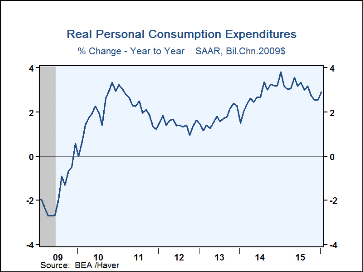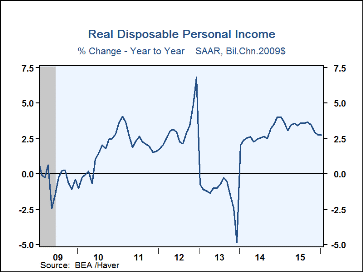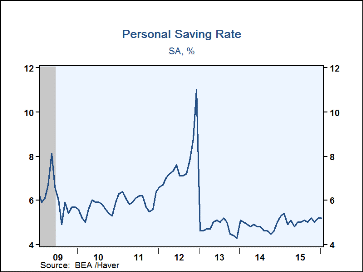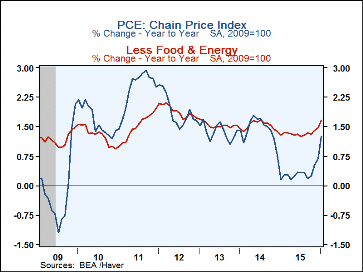 Global| Feb 26 2016
Global| Feb 26 2016U.S. Personal Spending, Income and Prices Accelerate
by:Tom Moeller
|in:Economy in Brief
Summary
Personal consumption expenditures strengthened 0.5% during January (4.2% y/y) after a 0.1% uptick, revised from little-change. It was the strongest rise since May. A 0.3% increase had been expected in the Action Economics Forecast [...]
Personal consumption expenditures strengthened 0.5% during January (4.2% y/y) after a 0.1% uptick, revised from little-change. It was the strongest rise since May. A 0.3% increase had been expected in the Action Economics Forecast Survey. Spending on durable goods was notably strong, up 1.2% (5.1% y/y). Motor vehicle purchases rebounded 2.2% (3.2% y/y) after a 2.4% decline. Furnishings spending rose 0.5% (3.8% y/y), the strongest rise in four months. Purchases of recreational products & vehicles surged 0.9% (8.4% y/y) on the heels of a 1.2% jump. Nondurable goods spending remained little changed (2.7% y/y), held back by a 5.1% drop (-4.6% y/y) in gasoline. Clothing & footwear purchases rose 0.5% (1.7% y/y). Services spending strengthened 0.6% (4.5% y/y) as housing & utilities jumped 1.1% (3.0% y/y). Financial services & insurance spending rose 0.8% (5.0% y/y), but foods services & accommodations spending backpedaled 0.4% (+6.1% y/y). Adjusted for price inflation, personal consumption rose 0.4% (2.9% y/y), also the strongest increase since April.
Personal income improved 0.5% (4.3% y/y) after three straight months of 0.3% increase. It was the firmest increases since May. Wages & salaries strengthened 0.6% (4.5% y/y), the firmest gain in three months. Rental income jumped 0.7% (7.5% y/y) while proprietors income gained 0.5% (3.3% y/y). Transfer receipts increased 0.4% (4.4% y/y) but social security payments declined 0.6% (+2.8% y/y). This decline was offset by a 0.6% rise in Medicare payments (5.0% y/y). Disposable personal income increased 0.5% (4.0% y/y), the strongest increase since June. Adjusted for price increases, income gained 0.4% (2.8% y/y).
The personal savings rate eased slightly to 5.2%, near where it has been since the end of 2014. Personal saving increased 1.6% y/y.
The chain-type price index improved 0.1% and reversed December's decline. The y/y gain accelerated to 1.3%, the firmest rise since late-2014. The index excluding food & energy also strengthened with a 0.3% increase (1.7% y/y), also the strongest rise since January 2012. The service price index rose 0.3% (2.1% y/y) and has been strengthening for a year. The durable goods index gained 0.1% (-0.9%), but that rate of y/y decline compares with -2.7% a year ago. The nondurables price index fell 0.4% (-0.3% y/y), but the rate of decline also has moderated.
The personal income & consumption figures are available in Haver's USECON database with detail in the USNA database. The Action Economics figure is in the AS1REPNA database.
The Graying of American Debt from the Federal Reserve Bank of New York is available here.
| Personal Income & Outlays (%) | Jan | Dec | Nov | Jan Y/Y | 2015 | 2014 | 2013 |
|---|---|---|---|---|---|---|---|
| Personal Income | 0.5 | 0.3 | 0.3 | 4.3 | 4.4 | 4.4 | 1.1 |
| Wages & Salaries | 0.6 | 0.2 | 0.5 | 4.5 | 4.6 | 5.1 | 2.7 |
| Disposable Personal Income | 0.5 | 0.3 | 0.2 | 4.0 | 3.7 | 4.2 | -0.1 |
| Personal Consumption Expenditures | 0.5 | 0.1 | 0.4 | 4.2 | 3.4 | 4.2 | 3.1 |
| Personal Saving Rate | 5.2 | 5.5 | 5.3 | 5.3 (Jan. '15) |
5.1 | 4.8 | 4.8 |
| PCE Chain Price Index | 0.1 | -0.1 | 0.1 | 1.3 | 0.3 | 1.4 | 1.4 |
| Less Food & Energy | 0.3 | 0.1 | 0.1 | 1.7 | 1.3 | 1.5 | 1.5 |
| Real Disposable Income | 0.4 | 0.4 | 0.1 | 2.8 | 3.4 | 2.7 | -1.4 |
| Real Personal Consumption Expenditures | 0.4 | 0.2 | 0.3 | 2.9 | 3.1 | 2.7 | 1.7 |
Tom Moeller
AuthorMore in Author Profile »Prior to joining Haver Analytics in 2000, Mr. Moeller worked as the Economist at Chancellor Capital Management from 1985 to 1999. There, he developed comprehensive economic forecasts and interpreted economic data for equity and fixed income portfolio managers. Also at Chancellor, Mr. Moeller worked as an equity analyst and was responsible for researching and rating companies in the economically sensitive automobile and housing industries for investment in Chancellor’s equity portfolio. Prior to joining Chancellor, Mr. Moeller was an Economist at Citibank from 1979 to 1984. He also analyzed pricing behavior in the metals industry for the Council on Wage and Price Stability in Washington, D.C. In 1999, Mr. Moeller received the award for most accurate forecast from the Forecasters' Club of New York. From 1990 to 1992 he was President of the New York Association for Business Economists. Mr. Moeller earned an M.B.A. in Finance from Fordham University, where he graduated in 1987. He holds a Bachelor of Arts in Economics from George Washington University.
More Economy in Brief
 Global| Feb 05 2026
Global| Feb 05 2026Charts of the Week: Balanced Policy, Resilient Data and AI Narratives
by:Andrew Cates










